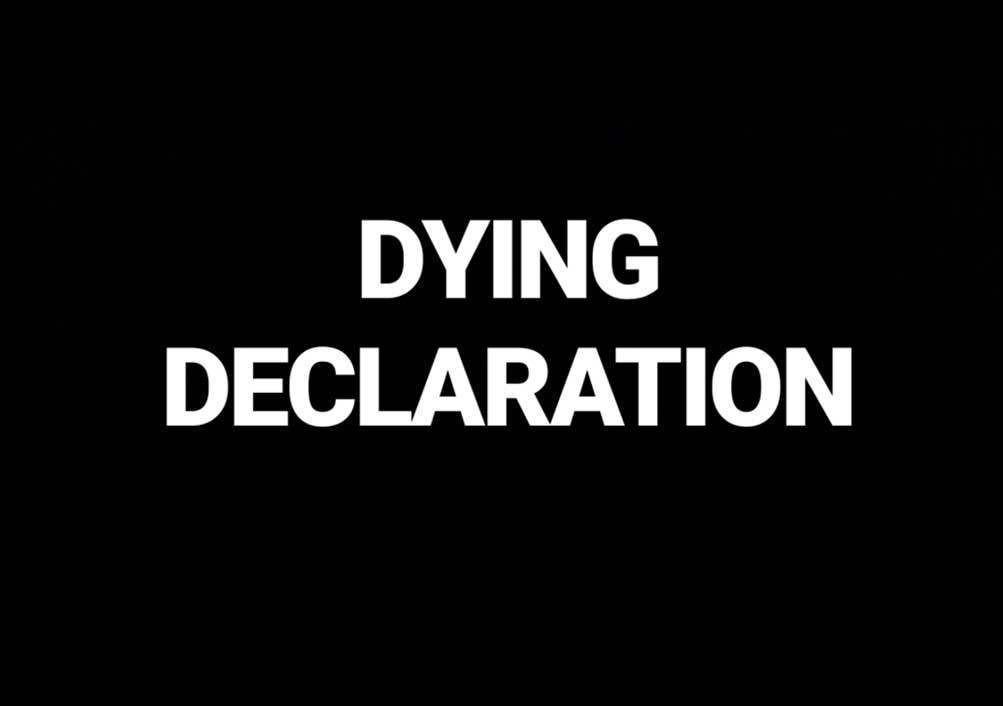In CRIMINAL APPEAL NO.209 OF 2014-BOM HC- Dying declaration is by itself sufficient to convict accused provided it is voluntary, truthful and inspires confidence of Court: Bombay HC Justices Sadhana S. Jadhav & Milind N. Jadhav [06-05-2022]

Read Order: SATISH MAHADEO KALE Vs. THE STATE OF MAHARASHTRA
Mansimran Kaur
New Delhi, May 09, 2022: The Bombay High Court has held that it is not necessary that a dying declaration shall necessarily be recorded in question and answer form or in any particular format. The deponent is not available for cross-examination and therefore, a heavy duty is cast upon the court to determine as to whether the said allegation is not only just voluntary but should be necessarily truthful.
While determining the credibility of the dying declaration, the Division Bench of Justice Sadhana S. Jadhav and Justice Milind N. Jadhav opined that the disclosure leading to the incident in which the deponent had died shall be consistent, cogent and corroborative. The prosecution has to pass this test by all means, as an onus is cast upon the prosecution to establish the guilt of the accused and authorship of the injury by the accused beyond reasonable doubt.
Relevant facts for the perusal of the present appeal were that the appellant got married to one Manisha. On November 18, 2009, Manisha was admitted to the Sassoon Hospital, Pune with a history of burn injuries. Since the case was medico legal, her statement in which she stated that she was married to the appellant who was an alcoholic and was not gainfully employed. She further stated that his husband use to always ask for her salary to buy alcohol. Thereafter she mentioned that she was physically assaulted by the husband on refusing to give money for alcohol and stated that the appellant downed kerosene on her and lit the match stick and threw at her. Thereafter her sister rescued her. On the basis of the statement of Manisha, a case was registered against the accused under Section 307 of the Indian Penal Code. She succumbed to the burn injuries and hence, the charge-sheet was filed for the offence punishable under section 302 of the Indian Penal Code.
The Court after taking into consideration all the material available on record observed that the history narrated by the patient before the doctor created a doubt in respect of the statement recorded between 9:00 p.m. to 9:45 p.m. which was held to be the dying declaration. The Court further opined, “ A dying declaration is by itself sufficient to convict an accused for the accusation levelled against him provided the dying declaration is found to be voluntary, truthful and hence, could inspire the confidence of the court.”
It was further noted that in a plethora of cases the Apex Court held that in case of multiple dying declarations/ statements of the deceased there shall be no variance whatsoever. The disclosure leading to the incident in which the deponent had died shall be consistent, cogent and corroborative. The prosecution has to pass this test by all means, as an onus is cast upon the prosecution to establish the guilt of the accused and authorship of the injury by the accused beyond reasonable doubt, the Court remarked.
In the present case, the accused did not accompany the injured to the hospital. The statement to the doctor was also a kind of dying declaration. While giving a history of accidental burns, there was no pressure or coercion either from the accused or his relatives upon the deponent to give a history of accidental burns, noted the Court.
It was further asserted that the appellant was in custody since November 18, 2009. Thus, the Court stated that the accused deserved to be acquitted of all charges framed against him in pursuance of the dying declaration as the same could also form another view and did not in definite terms confirm the alleged charges. The Court further added that whenever there is a possibility of another view, it would be incumbent upon the court to take a view in favor of the accused. Hence, the appeal was allowed.
Sign up for our weekly newsletter to stay up to date on our product, events featured blog, special offer and all of the exciting things that take place here at Legitquest.




Add a Comment